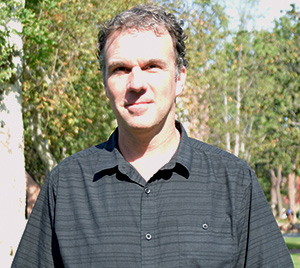
Scott Spencer
Scott Spencer was flying from Philadelphia to Los Angeles last May to meet up with his wife, who had just gotten a new job as the cantor of University Synagogue in Brentwood, when he struck up a conversation with the young girl sitting next to him.
He asked her why she was traveling to Los Angeles. To his surprise, she said she was going to meet President Obama and present a documentary she had made for school.
Her name was Ruth Hernandez, and she was the winner of USC Shoah Foundation’s IWitness Video Challenge, in town to attend the Ambassadors for Humanity Gala honoring President Obama.
Their conversation was fascinating, Spencer said – though Hernandez was only in ninth grade, it was like talking with the college students he teaches. They spoke at length about Hernandez’s project, social justice, issues faced by immigrants, transnationalism, digital technology and more. Though Spencer was familiar with USC Shoah Foundation and had even used testimony in college writing courses he taught at Villanova University, speaking with Hernandez gave him a much broader perspective of the impact of the Institute.
Fast forward eight months, and Spencer and Hernandez’s chance meeting on the plane is even more remarkable.
Spencer is now USC Shoah Foundation’s Project Manager of Holocaust/World War II Audiovisual Collections, managing USC Shoah Foundation’s Preserving the Legacy initiative which brings testimony collections from other Holocaust organizations into the Visual History Archive.
Spencer has a diverse background in academia, oral history and music, with previous positions including production assistant at the Milken Archives of American Jewish Music and technical advisor of the Tamiment Library and Robert F. Wagner Labor Archives at New York University. At City University of New York (CUNY) in the Bronx, he also started an oral history project to interview local musicians.
Since he started at USC Shoah Foundation about a month ago, Spencer has already had the opportunity to experience Preserving the Legacy in action. He observed the recent indexing training session for the new Canadian testimony collections, in which 10 new staff learned how to use the USC Shoah Foundation’s software to assign keywords to each minute of the testimonies that will be integrated into the Visual History Archive. Spencer thought the process of indexing is “incredible.”
“I don’t think there’s ever ben a collection effort like this in the history of mankind. Then, to have it fully indexed offers researchers this perfect window into longitudinal studies across a massive amount of information,” Spencer said. “I’ve never seen anything like it and I’m delighted that the researchers that I know have access to this. It’s brilliant.”
His new position at USC Shoah Foundation gives him the opportunity to combine many of his interests – community, social justice, academia, education, and oral history. It also allows him to make a positive impact on the world “In Perpetuity – capital I, capital P,” he said.
Spencer said he is most inspired by the way USC Shoah Foundation balances academia with community involvement, education and digital archiving. It’s rare to find an academic institution that is so dedicated and connected to the community it studies, he said.
“The role of oral history archives is finally being addressed and caught up to fields such as digital humanities,” Spencer said. “The importance of what happens at oral history archives is starting to be realized.”